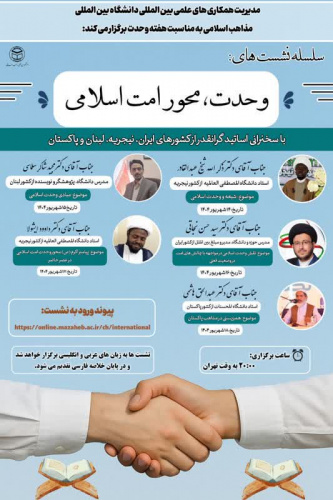On the occasion of Unity Week and through the efforts of the Office of International Academic Cooperation of the Islamic Denominations International University, a series of sessions entitled “Unity, the Axis of the Islamic Ummah” were held virtually from

Dr. Zikrullah Sheikh Abdul Qadir, professor at Al-Mustafa International University from Nigeria, stated:“Unity is good, and division is evil. Anyone with sound reason knows that unity originates from human nature. There are many Qur’anic verses on unity. With unity, we are like a single body. If Muslims unite, it will lead to the victory of the Muslim front; but without unity, strength will be lost. Today, we have around 42 Muslim countries. If these countries were united, Gaza would not be oppressed and subjected to tyranny. The role of Shia scholars in unity is evident in the establishment of this university, which organizes programs for unity. The founding of Ahl al-Bayt University and Sunni universities by Shia is a sign of unity, but enemies cannot tolerate this unity and always seek to sow discord.”
Dr. Mohammad Shakir Salmasi, researcher and religious author, said:“During Unity Week, we realize the necessity of unity. We have gone beyond the concept of unity and reached practical unity. After the events of the Al-Aqsa Storm, the Islamic world understood that unity is essential. The Qur’an considers us one Ummah, and this Ummah must have one leader, who is the Prophet of Islam. The Qur’an is one, the Ummah is one, the Kaaba is one — these are commonalities among Muslims, and we must focus on them, even though each school may have its own ijtihad. Sunnis acknowledge and respect the spiritual light of the Shia Imams. All sects agree that the Qur’an was revealed for guidance, which is a shared foundation. All Muslims pray in the same mosque and in the same rows. The beauty of the world lies in these differences. In society, whether we like it or not, there will be people with different views, and we must respect them. Everyone has the right to express their opinion, and that opinion deserves respect. He also referred to Gaza and emphasized that the Islamic world is increasingly realizing the necessity of practical unity.”
Hujjat al-Islam Dr. Seyyed Hassan Nejatizadeh, seminary and university professor, international preacher, declared:“The very first step the Prophet (peace be upon him) took was to establish the Islamic Ummah and create brotherhood. Referring to the events in Gaza and Palestine, he said: ‘What we see in Gaza today is the result of the lack of Muslim unity and the product of division and discord among Muslims.’ There must be economic cooperation among Muslim countries. Imam Khomeini said: If 20 governments unite, they can defeat 200 oppressive governments. All Islamic countries belong to Dar al-Salam, so why do some scholars not conduct research and conclude that unity is necessary? Why do some enjoy division? Political and economic cooperation is necessary, but today we also need military cooperation and can establish an Islamic NATO. Islamic countries are rich and, through cooperation, can become a great power.”
Dr. Dawood Ishola, professor at Al-Mustafa International University from Nigeria, also stated:“The choice of these days is symbolic, as it strengthens cohesion between Shia and Sunni schools, named by Imam Khomeini. The Prophet (peace be upon him) emphasized unity greatly; it was of utmost importance to him. The Prophet did not define the identity of Islam geographically, but based on civilizational identity, founded on faith, justice, benevolence, morality, and steadfastness. All these point to the importance of unity. Love for the Prophet (peace be upon him) is a shared value among the schools of thought, and one of its key aspects is creating affinity between them. The Prophet is for the entire world, not only for Muslims. The Supreme Leader has said that this very love for the Prophet can foster friendship between sects — indeed, all Muslims love the Prophet, and whoever loves him is our friend and brother. Muslims must know each other, feel joy in each other’s happiness, and grieve in each other’s sorrow. Today, we see Muslims worried about Gaza and trying to help its people. This very concern creates friendship and closeness among Muslims.”

Your Comment :